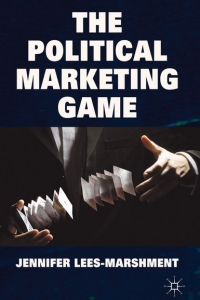Jennifer Lees-Marshment, author of The Political Marketing Game, shows how the marketing game is played and how to win it, reviewed by Joel Suss.
 The Political Marketing Game. Jennifer Lees-Marshment. Palgrave MacMillan. March 2011.
The Political Marketing Game. Jennifer Lees-Marshment. Palgrave MacMillan. March 2011.
The political game is increasingly about marketing. Focus-groups, opinion-polls, consultants and advertising are all utilized more than ever by politicians seeking an edge. This growing phenomenon leaves much to be concerned about. Politicians are ever more risk-averse and uncreative in policy formulation. Leaders seem hesitant in making necessary but unpopular decisions and there is a tendency to depend on market analysis and chase after the median voter rather than think outside the box. Voters, treated as consumers, are alienated when targeting and market segmentation leaves them on the sideline. Moreover, the general public simply lacks the expertise and knowledge requisite for governing (policy considerations are often complex and opaque) and so it can be dangerous that the public is guiding policy through opinion-polls or otherwise.
However, political marketing is also beneficial in a number of ways and may be driving an altogether positive transformation. Jennifer Lees-Marshment, author of The Political Marketing Game, shows how the marketing game is played and how to win it. She explains how marketing, when used properly, brings about beneficial change and concludes by arguing that political marketing is creating a partnership democracy in which both voters and politicians will ultimately benefit. This is because policy output is increasingly a function of deliberation and collaboration between the public and political leaders. Marketing is stimulating a more involved and information-laden public that is becoming increasingly engaged and responsible in decision-making. Politicians are using marketing ‘to merge pragmatism with principle to achieve broader goals, including advancing change’, and are not simply following market analysis.
The bulk of this book is devoted to describing the rules of the political marketing game. Lees-Marshment relies extensively on the experiences of actual practitioners, utilizing extensive interviews from a wide-range of people involved in political marketing, including important advisors to leaders such as George W. Bush, Tony Blair and Stephen Harper. The author establishes how marketing and communication can be employed successfully by politicians in an environment that is complex and in constant flux. However, this does not mean political marketing alone can deliver electoral success. Rather, pursuing a coherent strategy, attending to the demands of party members and other stakeholders, having strong convictions and values and a plethora of other considerations are important alongside marketing.
While the book provides an in-depth overview of modern practices and developments in political marketing, the author gets quite bogged down in establishing a rule-book for marketing success. The imperatives are often overly straightforward and predictable and practitioners are excessively quoted such that the flow of ideas is impeded. The real interesting aspects of this book, the implications of the marketing game on politics and democracy, are only developed in the last couple of chapters.
Indeed, the partnership democracy theory presented in the final sections is most interesting. The author argues that political marketing, which is essentially deliberative in character, is enhancing democracy. As political marketing becomes ever more widespread, voters are increasingly consulted. They are thus provided with opportunities to not only express opinions but provide solutions as well, hence taking a more participatory role in policy formulation. The internet and other powerful and cheap communication mediums, as well as the way marketing can be used, are aiding this participatory transformation. The disconnect between citizens and their representatives is thus being narrowed. As such, a viable partnership is being forged, improving the relationship between the public and politicians and advancing democracy in the process.
Lees-Marshment argument is an optimistic one. Much has been said of apathetic voters and those frustrated with the political game as it’s played, but that sentiment seems to be changing. In fact, after a prolonged downward trend in the UK and other Western countries, voter participation is on the rise. Citizens are finding new ways and spaces to express themselves and contribute to policy outcomes. Acknowledging that political marketing is here to stay, the author maintains that if used properly it will enrich democracy. This cheery prognosis, whereby citizens will be more engaged in politics and democracy functions better, is comforting but not assured. The author’s language is normative, explaining how political marketing ought to be used rather than how it is and might be. She therefore expects the full positive potential of political marketing to be realized. Let us hope that she is right.
——————————————————————————————-
Joel Suss joined the LSE PPG in January 2012 and is currently a MPA student. Hailing from Montréal, Canada, where he earned a BA in Political Science from Concordia University, Joel has worked in the most recent Canadian federal elections campaign for the New Democratic Party (NDP), now the official opposition to the government. He is primarily focused on public and social policy, welfare inequality dynamics and institutional reform. Read more reviews by Joel.





